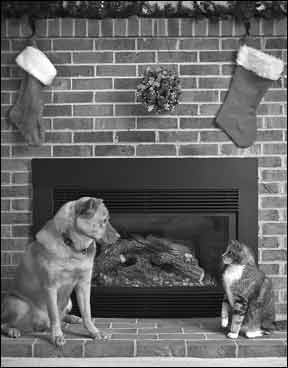With shopping, traveling and entertaining, the weeks between Thanksgiving and New Year’s can be anything but relaxing. However, humans aren’t the only individuals to suffer holiday overload. Cats can also become stressed, and if prolonged, the stress can result in changes in health and behavior.
“I could write a book about the physiology of stress,” says Germain F. Rivard, DVM, Ph.D., a resident in behavioral medicine at Cornell University College of Veterinary Medicine. “A cat under stress would change personality as he loses his coping mechanisms. Often, the reaction is avoidance with or without vocalizations, and if the cat cannot escape, he defends himself aggressively. That’s why it is important to create a safe place ahead of time.”
Two systems come into play when cats respond to stress:
-One consists of the hypothalamus, pituitary and adrenal glands (HPA).
-The other is the sympathetic nervous system, which increases heart rate, blood pressure, glucose production and availability of energy.
The HPA releases hormones, such as adrenaline, which affect the sympathetic nervous system’s functions. The responses prepare the body to deal with stress by running from it, freezing in place or aggressively fighting the stress.
“Chronic stress disrupts the HPA axis, and several brain structures can be affected by excessive hormone exposure,” Dr. Rivard says. “Some negative effects include increased sleep time, decreased appetite, behaviors that are out of context or stereotypic (compulsive) behaviors.”

288
Continued stress can also suppress the immune system, says Katherine A. Houpt, VMD, Ph.D., diplomate of the American College of Veterinary Behaviorists and emeritus James Law Professor of Animal Behavior at Cornell. “When the immune system is suppressed, sub-clinical problems may become clinical. For example, a bladder infection may appear.”
Goodbye, consistency. Dr. Rivard points out that new people, animals and situations can be difficult for many cats. “They can create anxiety and conflicts, as can competition for resources such as consumables, possessions, attention, affection and activities.” Even a simple change in routine can be stressful because cats generally cherish consistency.
Immediate physical signs of stress include vomiting, diarrhea, refusal to eat and skin problems. Behavioral changes include excessive self-grooming, turning the body away, walking or running away completely and what Dr. Houpt calls the meatloaf pose: The cat lies on his stomach with his legs tucked and hidden under his body. He may be hyperactive or, conversely, may act apathetic and non-responsive. Some cats may hiss when approached. Others may spray urine on vertical surfaces. A behaviorist should be consulted if the cat’s primary care veterinarian finds no sign of disease.
Dr. Rivard points out that if the cat cannot cope appropriately, there are adjunct therapies, including pheromones, and (anti-anxiety) medications such as anxiolytics prescribed by a veterinarian that can alleviate the response to stress. “Medical treatment in combination with a behavior modification plan should be considered,” he says.
Forestalling the manifestations of stress requires a little vigilance and common sense from the owner:
-Manage canine visitors. Until you know how your cat will react, “Keep the guest dog on leash,” Dr. Houpt says. “And use baby gates to separate the dog and cat.”
-Supervise children. They may not realize when a cat has had enough attention. If your cat squirms or otherwise is clearly trying to get away from a child, call the child away.
-Consider boarding if your cat does well with it. For some cats, being away is preferable to being in a home filled with holiday chaos and visitors. “It’s better than a lawsuit that could result if the cat bites,” Dr. Houpt says.
-Chill. Cats may become stressed if they sense that their owners are anxious. “Reduce your own stress,” Dr. Houpt says. “Don’t be a perfectionist.”
Finally, when the holidays seem to overwhelm you, set aside some private time for you and your cat to enjoy each other’s company. Time spent with loved ones is what the holidays are really all about.




